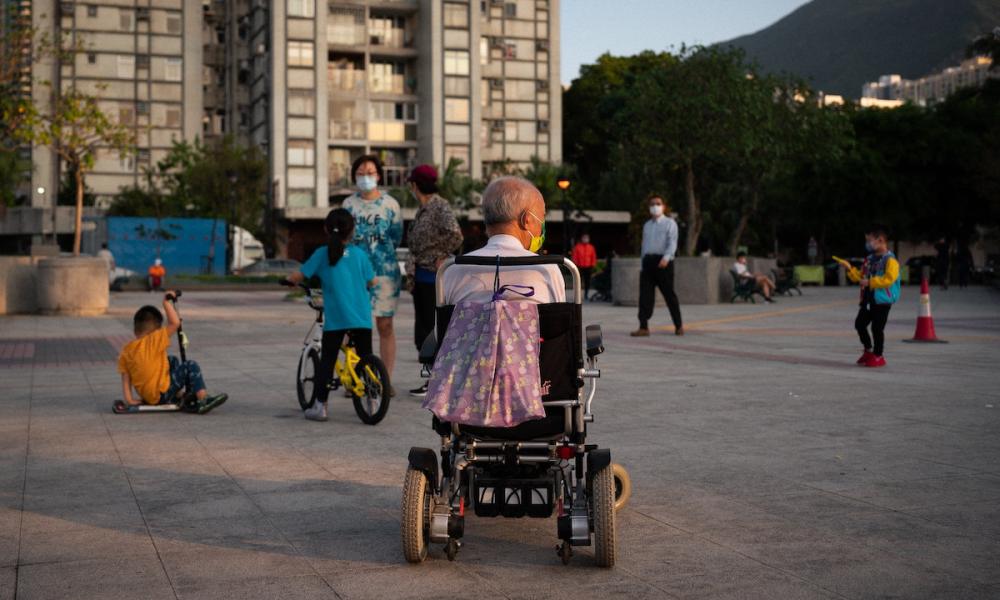Disability and climate justice: How to create a more inclusive movement


During the COP26 summit in Glasgow in November 2021, I learned that Karine Elharrar, an Israeli minister, was unable to attend the conference because of the inaccessibility and non-wheelchair-friendly building. Sadly, I wasn’t surprised. Having grown up with an older disabled sister and witnessing the everyday obstacles and discrimination she encounters, the case of COP26 seemed to fit the global norm. It is a representation of a wider exclusion of disabled people from public, economic, and political life. Even more distressing is that disabled people are at the frontline of climate change and face disproportionate impacts on their livelihoods.
Disability and climate change
According to the UNESCAP, disabled people are two to four times more likely to die following a natural catastrophe than non-disabled people. The case of Hurricane Katrina brutally displays this discriminatory devastation, as “73% of Hurricane Katrina-related deaths in the New Orleans area were among persons age 60 and over, although they comprised only 15% of the population” (American Association of Retired Persons). Most of those individuals had medical conditions and functional or sensory disabilities. A wide range of factors interplay as to why disabled people are disproportionately impacted, these include:
- insufficient housing and low livelihoods, which increase their exposure to risks
- of inaccessible shelters and evacuation protocols
- and separation from carers and assistive devices.
Ultimately, it is the exclusion from disaster risk reduction efforts and ableist-constructed barriers that place disabled people at a greater risk.
Ableism is the construction of society in favour of non-disabled people. Disabled people are not disabled due to their impairments, rather they are disabled by structural and systemic barriers within society. Through inaccessibility and the lack of a disability focus framework, these barriers are entrenched throughout climate policies. The ban on single-use plastic straws is a poignant example of eco-ableism, which is defined as environmental plans for disabled people to make lifestyle changes without fully understanding and addressing their needs. What appears to be a simple step forward for environmental sustainability is, in fact, a disregard for the necessity for those people who require strong long-lasting straws to drink. Anyone who has used a paper straw knows after a few sips it’s essentially useless.
A climate justice movement
The needs and experiences of people with disabilities have been ignored and alienated within the broader climate justice discourse and movement. In the 2018 Intergovernmental Panel on Climate Change (IPCC) report, “disability” was only mentioned five times in its 1,515-page document. The 2022 report is an improvement as it further recognises the disproportionate impact on disabled people, but it still lumps the complex term ‘disability’ with the other ‘vulnerable’ marginalised groups. This portrayal of disabled people as vulnerable represents the ableist assumption that disabled people are unable to contribute to climate adaptation and discussions. However, this is far from the truth.
Furthermore, how many disabled people do you witness in photographs and news stories of climate demonstrations? Disability is a wide spectrum and hidden disabilities are prevalent, but there remains an obvious absence of the disabled community within the climate justice spotlight and dialogue. Within the movement itself, there are often shortfalls in inclusivity. Demonstrations, like those in London, frequently take place where accessible transport is absent, as only one-third of tube stations are step-free. The lack of British Sign Language interpreters for speeches excludes the deaf and hard of hearing. Demonstration marches conducted at a fast pace and for long distances may prevent wheelchair users and hard of walking from participating. Large, claustrophobic, noisy crowds dismay potential activists on the autistic spectrum. There are even cases of police intentionally taking away the equipment of activists and quite literally disabling them.
Inclusivity and accessibility
Nonetheless, inclusivity and progress has being made. Climate justice groups are beginning to recognise the requirements of disabled people and many have involved disabled members within their committee circles. Leading organisations have also set up branches to establish more safe and disabled-friendly movements, including the brilliant Extinction Rebellion Disabled Rebels which welcomes disabled people to join the movement and connect with members in a more inclusive and supportive environment. In addition to this, social media and the growth of accessible online platforms, empower disabled people to proclaim their voice, illustrate their experiences, and raise awareness of the barriers they face daily.
When discussing climate justice, the emphasis and framing need to change. It’s well recognised that it’s vital we engage with indigenous groups and learn from their relationship with their ecosystems to establish a sustainable climate-friendly way of life. Likewise, the adaptive capacity and resilience of disabled people to overcome everyday obstacles in a world designed for the non-disabled can teach us how to adapt to the complex changing climate. The leaders of the climate justice movement need to represent those who are impacted the most. Not for the sake of tokenism, but for representation and greater insight. Climate justice and disability rights are intertwined, co-dependent and reinforce one another. To tackle the climate crisis and strive for a fair and just world, we must bring down the systemic barriers that exclude disabled people and fight for their rights to be recognized. Climate justice is also social justice, and ableism has to be situated within climate justice discourse.
About the Author
Jake Clarke is an MA Migration and Diaspora Studies student at SOAS. He has a specific interest in the impacts of climate change and the intersections with disability studies.



